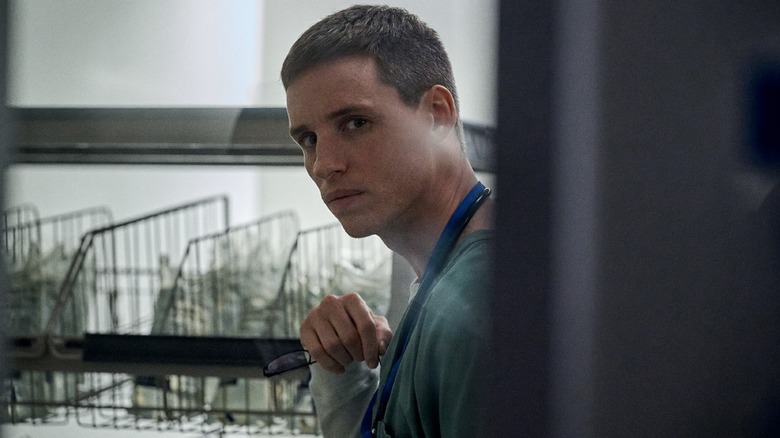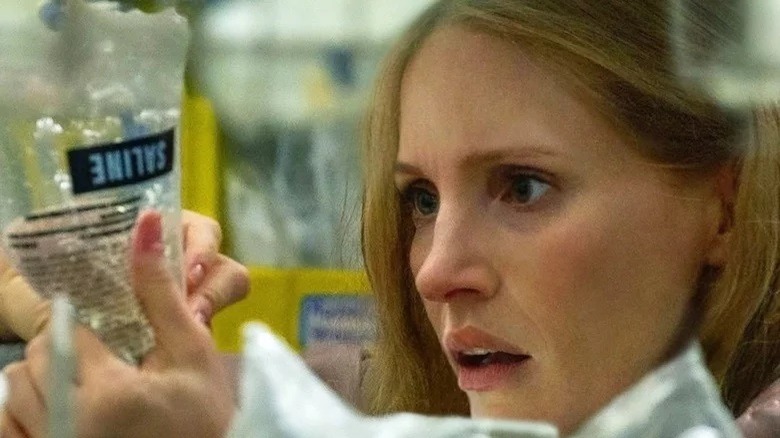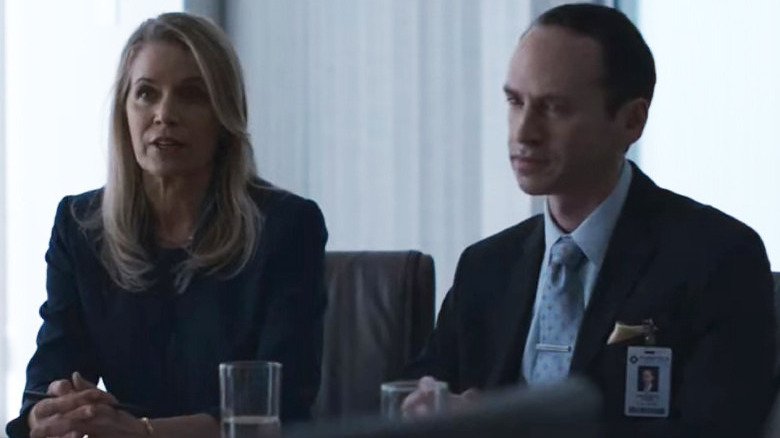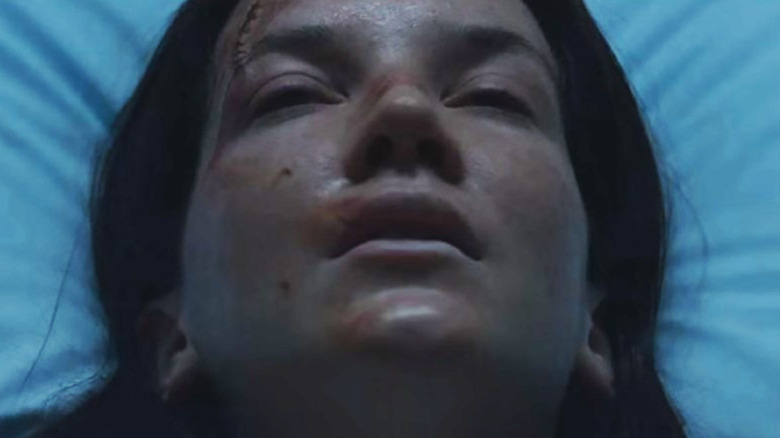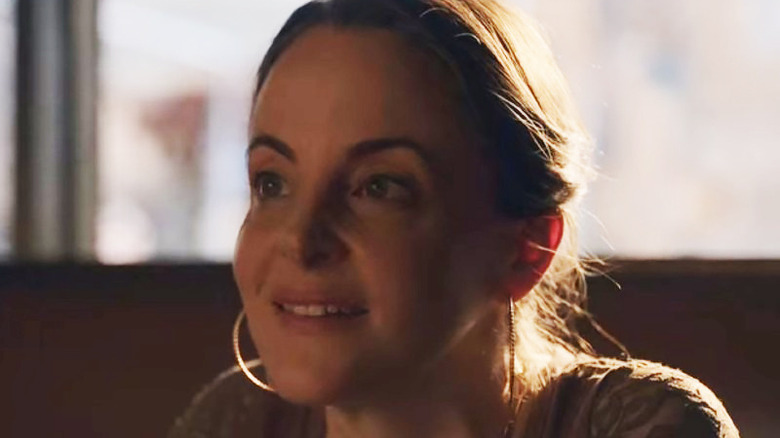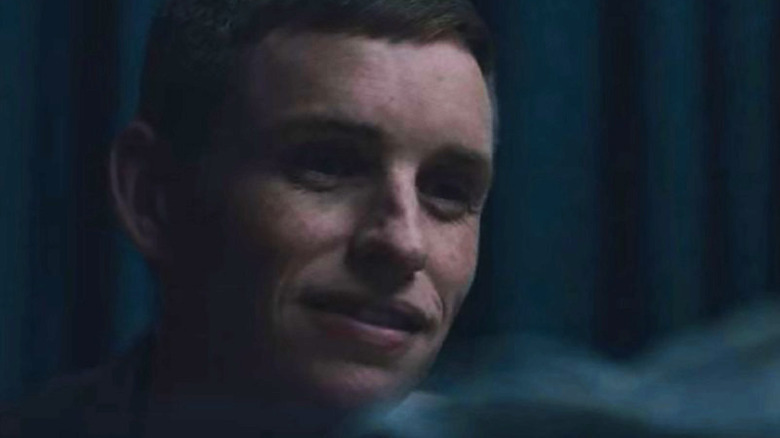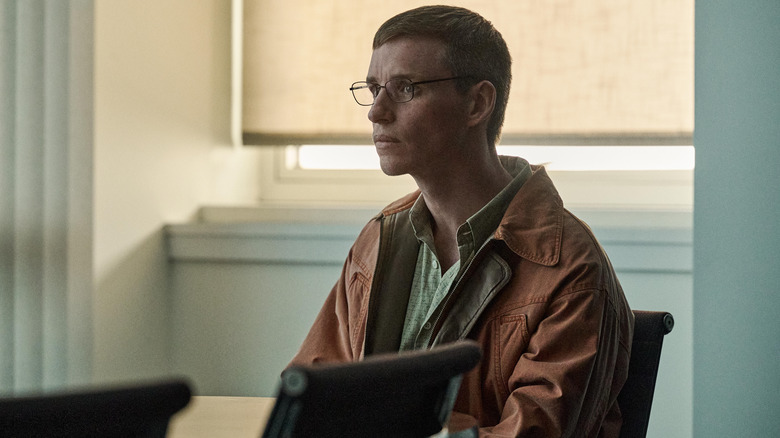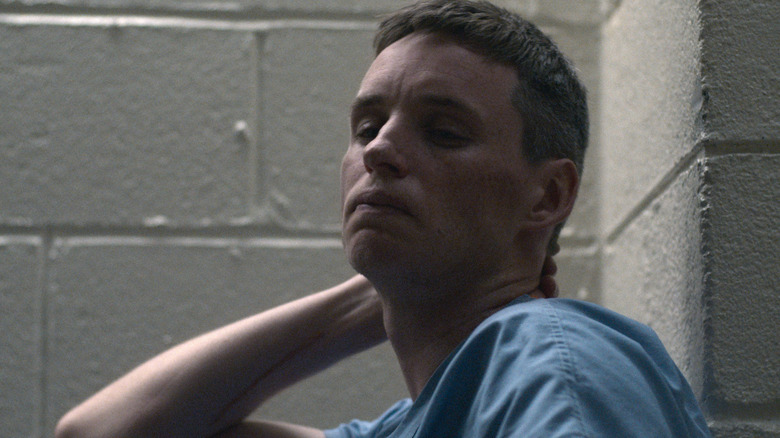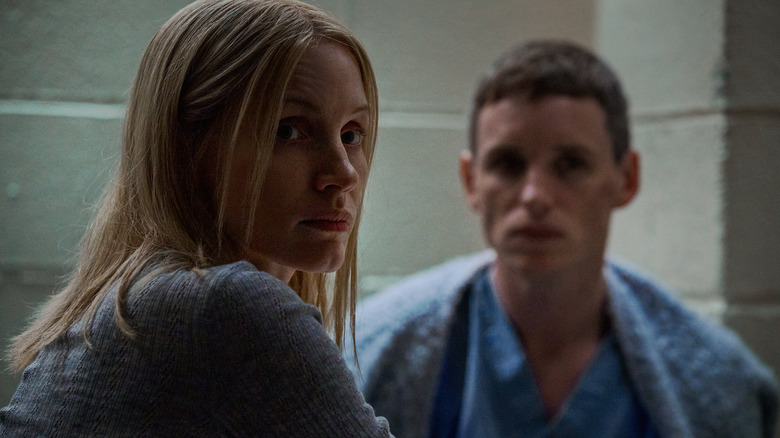The Most Disturbing Moments From The Good Nurse
Warning: The following article contains major spoilers for the Netflix film "The Good Nurse."
Any show or film "based on a true story" is guaranteed to have a built-in creep factor. In the case of "The Good Nurse," the story rips pages from Charles Graeber's 2013 book " The Good Nurse: A True Story of Medicine, Madness, and Murder," which details how real-life serial killer Charles "Charlie" Cullen murdered dozens (possibly hundreds) of people. The film, co-starring Eddie Redmayne as Cullen and Jessica Chastain as the eponymous good nurse Amy Loughren, is the latest in a long string of serial killer adaptations to hit Netflix, for better or worse.
While the film itself falls a little flat, there is plenty to admire about both Chastain's and Redmayne's performances. Redmayne, in particular, makes a disturbing turn as the deadly nurse, who insidiously wields his power to kill people under the guise of simply doing his job. Below, /Film takes a look at the film's most disturbing moments and compiles scenes that just seem to burrow beneath the fingernails. Grab your popcorn, and settle in for the ride.
Ana's suspicious death
Patient Ana Martinez (Judith Delgado) is admitted to the emergency department after suffering an adverse reaction to an antibiotic called amoxicillin. In a fragile state, she grows close to night nurse Amy (Jessica Chastain), who is attentive and caring, even allowing Ana's husband to spend the night. Ana is stabilized and appears to be getting better 一 until she isn't.
In a bizarre turn of events, she expires (as it's called by Kim Dickens' hospital delegate Linda Garran), and her body is left unattended. When they clock in for their shift, Amy and Charlie (Eddie Redmayne) go about cleaning her body to prepare for the coroner's arrival. Amy is called away to tend to another patient and leaves Charlie alone.
It's a brief scene, but it's downright chilling. Charlie finishes cleaning Ana's body and stands over her. He gazes into her cold, lifeless face. His face is blank, almost detached and unfeeling from the present moment. It is quite evident he relishes her death, as though he were God himself. Even without the context of the film, Charlie's stare is enough to make your blood run cold.
Internal investigation
One of the most troubling aspects of the film centers around the internal investigation conducted by the hospital. Much like real life, Parkfield Hospital tightens the hatches around its employees and keeps strict guidelines for interviews with detectives Danny Baldwin (Nnamdi Asomugha) and Tim Braun (Noah Emmerich). Discussions can absolutely not focus on medications that may or may not have been given to Ana Martinez, and employees must walk a tightrope in any conversation about their fellow nurses.
When police request files on the facility's supposed internal investigation, the hospital sends over a single manilla folder. It allegedly contains all the investigating they achieved over eight weeks since Ana's tragic death. But numerous missing pages would tell an altogether different story.
It's a textbook cover-up, led by Garran and the hospital's attorney Duncan Beattie (David Lavine), indicating a total disregard for human life. The mere implication that this actually does happen in real life is all the more disturbing; you just never know who you can trust when you're admitted for treatment.
The second death
Admitted for a severe neck injury, Kelly Anderson (Anjelica Bosboom), is married to Tom (Gabe Fazio) and is also a mother to a six-month-old baby girl named Vanessa. She's in excruciating pain but on the mend, told it will only take a little time to recover. When Amy clocks in for her shift, she goes to Kelly's room to do a check-in. She finds the patient unable to remember her daughter's name or squeeze Amy's hand in response. Kelly seizes and her body crashes in response to insulin found in the saline bag. It appears to be a mistaken double dose that should never have been administered to begin with.
By the time Tom arrives with Vanessa, Kelly has expired. Tom breaks down into a blubbering mess, handing Vanessa over to Amy to hold as Charlie looks on from down the hall with his signature cold, unfeeling gaze. There's nothing that'll be able to shake that image from your mind.
Lunch with Lori
Amy breaks up her afternoon by meeting with an old friend named Lori (Maria Dizzia). While gabbing about life, Amy asks Lori what it was like working with a former colleague, the one and only Charles Cullen. Lori's bright disposition quickly fades, replaced with a far more concerned, almost fretful look.
She reveals that there were disturbing rumors about him being connected to a patient's death. Even though they couldn't prove it, there was enough circumstantial evidence to at least implicate him. A slew of saline bags was found with pinpricks, for example, an indication that someone was tampering with the bags before they even left the storage room. Added to this was the fact two or three codes were announced every night, while only one per month was called after he left.
Suspicions growing in her mind, Amy later discovers a saline bag in the store room with a single pin prick. There's no longer a doubt in her mind. Charlie has been killing people in the most undercover way he possibly could. Both scenes underscore the very insidious and terrifying way evil manifests itself in the world.
Bedridden
A single mother to two daughters, Amy struggles to keep her life together. To make matters worse, she suffers from cardiomyopathy, a disease that affects the heart's ability to pump blood to the rest of the body. During a long shift, Amy collapses on the floor and is taken into the emergency department.
When she awakens, she finds Charlie sitting at her bedside. Her suspicions aroused, Amy brushes off his suggestion to look after her daughters. Her eyes focus on him like a hawk. Even when he offers a sip of water, she declines. She knows what he is capable of and won't take any chances. Charlie's deceptive grin is not only unsettling but it's psychotic.
Behind his gleaming eyes, he harbors an insidious form of evil. He doesn't have to be a Jeffrey Dahmer or a Ted Bundy — although he is just as charming. He infects the world without anyone knowing it. He hides behind his nurse's badge to disarm his patients and creeps into their lives, ultimately acting as judge, jury, and executioner. That might be the most terrifying thing of all.
You're fired
Parkfield Hospital eventually catches on to Charlie's diabolical plot and fires him over discrepancies in his application. It's a frivolous reason, yet it says everything without actually saying anything. Linda Garran, a former nurse, is well aware of when power is abused, particularly as it relates to medication cancellations. She might be nothing more than a mouthpiece for the higher-ups, but perhaps she does have a heart somewhere.
That night, Charlie surprises Amy when she returns home, and she finds him hanging out with her daughters. She doesn't even make an attempt to mask the horror on her face. She's nearly in tears and demands her daughters go to their rooms. But Amy plays it as cool as she can. She wouldn't want to upset him or even suggest she knows what he's been doing.
She tip-toes around a conversation about Charlie's awful year and his divorce. He reveals his wife allegedly "made up a story about poisoning the dog" 一 yeah, that tracks. The moment is a quieter one for this list, but it's no less disturbing. It's disturbing in that Charlie pretends like nothing is wrong and that what he's been doing is not reprehensible. That's the sign of a real monster.
Interrogation
Charlie Cullen's sociopathic behavior comes to a roaring boil during interrogation. Led by Baldwin and Braun, the questions are fairly innocuous at first. The detectives have to be calculated in how they play their hand. Their questions become increasingly more direct about what happened. They also attempt to appeal to his ego, complimenting how he went about pricking saline bags and outsmarting the Pyxis machine. But he doesn't take the bait.
The line of questioning grows more intense, yet Charlie holds his ground. "I can't," he repeats over and over again. Soon, he begins screeching the words until he's red in the face. He throws a childish tantrum and bangs the handcuffs on the table in retaliation. It's clear no matter how hard they pry or how they manipulate their questions, Charlie Cullen would rather die than divulge the details about why he did what he did.
There is an indication of how he became this way, though. Earlier in the film, Charlie shares the story about how he found his dead mother in the hospital as a child, a likely traumatizing event that sent him down such a dark, twisted path. Even so, he never confirms nor denies that this is the case, so it's left a total mystery.
Charlie's confession
When the interrogation doesn't work, the detectives invite Amy into the room. Her approach leans into his humanity and the kindness he showed during her health problems. The facade slowly slips down and he asks, "What do you need me to do?" "Tell the truth," she responds. He then lists off all the names of those he murdered, including Ana Martinez and Kelly Anderson.
But that's not the disturbing part. When Amy asks why he did it, his response is bone-chilling: "They didn't stop me." Where his emotions exploded earlier in the interrogation, he is now cold, emotionally detached, and almost clinical in the way he speaks about the murders. Then again, Charlie Cullen is a psychopath and familiar with manipulating others with his emotions. He can turn on a dime, and you never know what'll come out of his mouth next. That's what makes him one of the most disturbing killers in history.
In real life, Charlie confessed to 29 murders, but that number is believed to actually be around 400. "The Good Nurse" is far more focused on Amy and her story and only gives viewers morsel-sized glimpses into Charlie's mind. And that's enough. These scenes don't necessarily need to be loud or in-your-face; it's the stillness that can be most unsettling.
